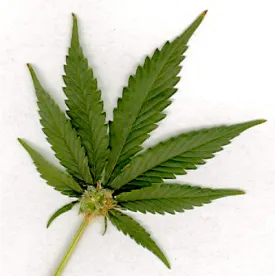Marijuana, a Schedule 1 drug under the federal Controlled Substances Act (CSA), is the most commonly detected illicit drug in employment drug testing. According to Quest Diagnostics, in 2018, approximately 3% of urine-based workplace drug screenings tested positive for marijuana. Notwithstanding marijuana’s illegality under federal law, 33 states and the District of Columbia have legalized marijuana for recreational or medicinal use. And it is big business. The Colorado Department of Revenue recently revealed that its tax, license and fee revenue from marijuana has reached $1.02 billion. Legal marijuana appears here to stay in the United States.
Many state and local jurisdictions have enacted anti-discrimination laws concerning marijuana use. Generally, such laws prohibit employers from taking adverse action against an employee who uses marijuana in conformance with the local jurisdiction’s marijuana laws, so long as the employee does not consume cannabis at work and is not impaired while on the job. But because of the way the human body metabolizes cannabis—traces of marijuana can persist in a person’s body for as long as 30 days after it was last used—it is difficult for employers to determine, much less prove, whether an employee is actually impaired by marijuana on company time, as opposed to outside of work on personal time. That difficulty creates liability for employers who act on a positive drug test. Even if an employee is impaired at work, proving so can be challenging, and employers therefore need to proceed carefully when executing their drug policies.
In the first wave of employment cases concerning marijuana use since marijuana legalization began, the courts tended to side with employers. In California, employers can terminate workers who test positive for cannabis so long as the employer complies with its “drug-free” policy. In Colorado, the Colorado Supreme Court in 2015 unanimously affirmed a lower court decision that a company was within its rights to terminate an employee for using marijuana. According to the Colorado Supreme Court, the state’s medical marijuana law did not preempt the company’s “zero tolerance” policy.
The tide, however, is turning. Recent decisions in federal and state courts indicate that employers need to proceed with caution when they make employment decisions concerning drug tests for cannabis use. In Arizona, for example, a federal judge decided a case concerning a customer service supervisor at a nationwide retailer. The supervisor had been leveling bags of ice in an ice machine when a bag fell on her wrist. The injury resulted in a trip to an urgent care center, and company policy therefore required the employee to submit to a drug test. As a registered user of medical marijuana pursuant to the Arizona Medical Marijuana Act (AMMA), the employee inevitably tested positive for cannabis metabolites. The company terminated her for failing a drug test and, as a result, she had difficulty accessing workers’ compensation to cover her medical treatment. AMMA, however, makes it illegal for an employer to terminate an employee because of a “positive drug test for marijuana components or metabolites, unless the patient used, possessed or was impaired by marijuana on the premises of the place of employment or during the hours of employment.” The employee filed a lawsuit against her former employer, alleging discrimination and wrongful termination in violation of the AMMA, the Arizona Civil Rights Act, and the state’s worker compensation law. Earlier this year, the United States District Court for the District of Arizona sided with the employee and determined that the employer wrongfully terminated her. Before the court made any decisions concerning damages or reinstatement, the parties notified the court that they had settled the matter.
A Delaware state court recently faced facts similar to those at issue in the Arizona case. The court held that a medical marijuana user may proceed with a lawsuit against his former employer after his employment was terminated due to a positive post-accident drug test result for marijuana. The plaintiff relied on the anti-discrimination provision of the state’s medical marijuana law, while the employer argued that federal law preempted the state law because marijuana is illegal under the CSA. According to the Delaware court, the Controlled Substances Act “does not make it illegal to employ someone who uses marijuana, nor does it purport to regulate employment matters within this context.” The court further stated that the anti-discrimination provisions of the state medical marijuana law do not pose an obstacle to the objectives of Congress and do not require employers to participate in illegal activity. Rather, the state medical marijuana law prohibits employers only from discriminating against employees based upon medical marijuana use. The court therefore rejected the employer’s preemption argument.
Not long ago in Connecticut, a rehabilitation center offered someone a position as its recreation therapy director. The job applicant then disclosed that she used medical marijuana, solely at bedtime, to treat post-traumatic stress disorder that she suffered as the result of a car accident. The applicant was a “qualified patient” under the Connecticut Palliative Use of Marijuana Act, but the employer withdrew the job offer anyway. The applicant then sued the company for discriminating against her based on her marijuana use. Last month, a federal judge ruled that the employer violated an anti-discrimination provision of Connecticut’s medical marijuana law when it withdrew the job offer.
New Jersey courts are protecting medical marijuana users, too. For example, a New Jersey state appellate court recently held that a disabled employee may sue his former employer under the New Jersey Law Against Discrimination (NJLAD) for alleged discrimination based on the employee’s use of medical marijuana. Although the New Jersey Compassionate Use Medical Marijuana Act (NJCUMMA) does not prohibit employment discrimination based on medical marijuana use, the court held that the NJCUMMA does not immunize “employers from obligations already imposed elsewhere [such as under the NJLAD].”
Local legislatures also are stepping in to protect workers who use marijuana lawfully under local law. In April of this year, the New York City Council passed a law that prohibits employers from testing applicants for marijuana and, starting in 2020, employers in Nevada cannot refuse to hire someone for failing a marijuana test. Gov. Steve Sisolak signed the bill on June 5 after state lawmakers approved it. “As our legal cannabis industry continues to flourish, it’s important to ensure that the door of economic opportunity remains open for all,” he said.
In light of the wave of legislative and judicial developments across the nation concerning legal marijuana use, employers need to stay aware of recent court decisions and legislative developments as they create and implement their workplace drug use policies. Moreover, employers should appreciate the limitations of marijuana testing and how those limitations affect their practices and policies. In the meantime, suffice to say that judges are siding with employees who use medical marijuana, outside of work, in conformance with local law.




 />i
/>i

